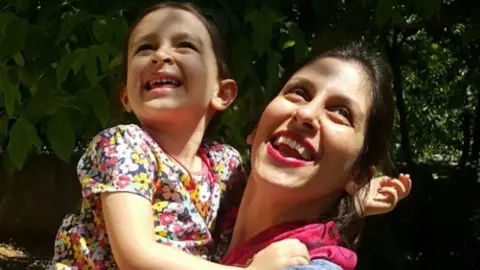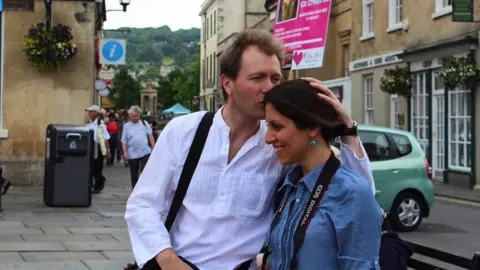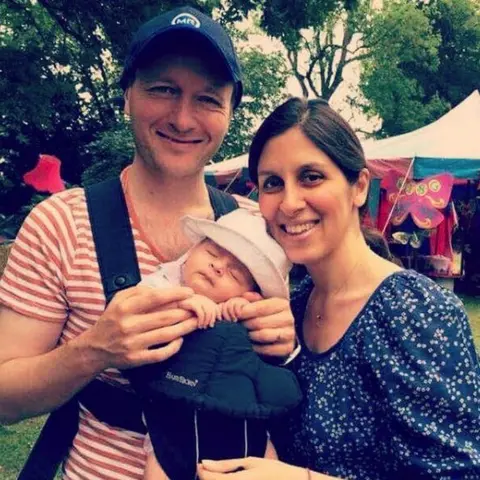Nazanin Zaghari-Ratcliffe needs mental health treatment, charity says
Nazanin Zaghari-Ratcliffe, the British-Iranian woman held in Iran since 2016, needs urgent treatment for her mental health, according to a medical report sent by a charity to the UK government.
The charity worker faces a new court hearing in Tehran on Sunday, a week after her ankle tag was removed.
The report says she is suffering from major depression and PTSD.
Despite her sentence coming to an end, she is still waiting to return to the UK to be reunited with her family.
Mrs Zaghari-Ratcliffe was sentenced to five years in prison in 2016 for membership of organisations working against the Iranian government, allegations which she has always denied.
Prior to the recent removal of the ankle tag, the dual national had been under house arrest in Tehran since being released from jail last March.
Prime Minister Boris Johnson has called for her permanent release so she can return home to her husband and young daughter in the UK.
The report - commissioned by the human rights charity Redress - says she was interrogated for hours, often blindfolded, while in solitary confinement at the beginning of her sentence.
The Redress report was based on a medical evaluation carried out virtually by doctors while Mrs Zaghari-Ratcliffe was under house arrest towards the end of last year. It was completed last month and sent to the government on Thursday.
Neither Mrs Zaghari-Ratcliffe nor her husband Richard has felt able to read the report in full, but both feel that it is important to have her ordeal documented, giving the charity the go-ahead to share the details with the BBC.
In the medical evaluation, she also told doctors she suffered hair loss, had to listen to her female guard talking loudly to her child while separated from her own daughter, and developed OCD around washing.
According to the report, her post-traumatic stress disorder, depression and obsessive stress disorder are due to "extremely stressful, traumatising experiences in the prisons of Iran" and the uncertainty about her fate - and warns things could worsen without her being treated and reunited with her family in the UK.
 Free Nazanin Campaign
Free Nazanin CampaignMrs Zaghari-Ratcliffe, 42, was arrested in April 2016 while travelling to visit her parents in Iran with her British-born daughter, Gabriella, who is now six years old.
Whilst in solitary confinement at the beginning of her sentence, she was interrogated - often blindfolded - for eight to nine hours a day, she told the doctors who examined her online.
"The interrogations were traumatising," she is quoted as saying in the report. "They were threatening to send my child away, told me my husband was a spy, that he had already left me, that he was lying to me, that he worked for the British intelligence service.
"They said he was unfaithful, they said he was not an accountant and that he had always been lying to me. They told me I had been fired from my job."
She says she was in a tiny cell - a 1.5 to 2-metre square - during solitary confinement. It had no window, made her feel claustrophobic and she could not tell the difference between night and day.
"The light was left on all the time there was only a dirty mat on the floor with a thin blanket to sleep on," she says. "There were times I could not breathe."
She was only allowed one sanitary pad a month during this time.
 Handout
HandoutMr Ratcliffe says of his wife's documented experiences: "This is mental torture. It's a really horrific experience. And it's cumulative. And it builds up. And of course, most of it has been hidden away.
"She didn't talk about it a lot when she came out. I don't talk to the media about some of the stuff. But I think it's important to put it on the record. It's important that our government takes responsibility for protecting people."
The two doctors carrying out the evaluation were told that, while in prison, she developed OCD centred around cleaning rituals.
Mr Ratcliffe spoke to the BBC of his wife's "need to try and control what you can, leading to a sort of obsessive control about certain things and having certain routines to cope with the other things you can't control - all the things that are completely out of your hands".
He adds: "And of course, Nazanin's entire life is out of her hands."
'It was unbearable'
Her interrogators tried to pressure her into co-operating with them, in exchange for clemency, she told the doctors.
"I said that I could not do, that I said I needed so much psychological help that I was not even sure I could work for myself, let alone work for my captors," she reported.
She told the doctors that one of her female guards would talk loudly to her child just outside her cell, while Mrs Zaghari-Ratcliffe was separated from her own daughter.
"It was unbearable," Mrs Zaghari-Ratcliffe told the medics. "I dreaded her shifts as I knew she would do that to torture me."
 Free Nazanin Campaign
Free Nazanin CampaignIn July 2018, she spent a week in a psychiatric hospital, accompanied by prison guards and chained to the bed by both her feet and hands.
Her incarceration took a significant physical toll on her health as well, the report finds. At one point, in jail, her hair was falling out and she was too weak to climb up to the top bunk in the women's ward where she was held for most of her imprisonment.
The report details the continuing guilt and anguish she feels and says she has tried to put a brave face on her ordeal and hide her symptoms from her parents, with whom she now lives.
"She knows that her suffering traumatises her parents and that her post-traumatic symptoms, like irritation and anger, harm her parents' psychological health," the report says.
"She also knows that her absence might create serious traumatic problems in her daughter who is being forced to grow up without the presence of her caring mother. Her imprisonment is a huge burden on her marital relationship. As her husband is struggling to gain her freedom, these efforts also keep him in a constant state of stress and suffering instead of continuing the ordinary life of a parent and a husband."
Dr Michele Heisler, medical director of Physicians for Human Rights, is one of the doctors who conducted the evaluation for the Independent Forensic Expert Group.
She described Mrs Zaghari-Ratcliffe as a "remarkably resilient woman" who was "trying to keep hope, trying to be strong" during her evaluation.
But she said: "Her current situation continues the psychological torture. Although she has finished five years of being imprisoned, she faces ongoing threat and uncertainty."
'Long road to recovery'
She may have spared her parents the details, but Mrs Zaghari-Ratcliffe reported to the doctors that she felt constant sadness, had suicidal thoughts, and suffered other manifestations of extreme anxiety - including trembling, tingling, and hot and cold sweats.
Concern that lumps in her breasts could be cancerous have contributed to her anxiety. And she also has continuing neurological and muscular-skeleton problems, as a result of prolonged confinement, according to the report.
The doctors say it is "possible that the positions in which she was handcuffed for extended periods led to nerve and joint injury" in her right hand.
And even once she is safely home in the UK with her family, the report makes clear that there will be a long road to recovery.
She will need medication as well as psychotherapy and treatment for her physical symptoms.
 Free Nazanin Campaign
Free Nazanin Campaign"Nazanin's healing can be only provided in the UK in the presence of her family after reunification," it concludes. "In order to recover, she needs to be in a safe and non-threatening environment."
But it's not clear whether Sunday's court hearing will be used to block her return to the UK.
"The threat of a second trial remains very real," says Rupert Skilbeck of Redress, which acts as her and her husband's legal representative.
"This report is evidence of the severe suffering that Nazanin has experienced in Iran due to the mistreatment suffered and the cruelty of a legal process that has never followed the rule of law, making it impossible for Nazanin to know when she will be reunited with her family."
Her treatment, Redress says, clearly amounts to torture.
In a statement, the Foreign Office said: "Iran continues to put Nazanin Zaghari-Ratcliffe through a cruel and intolerable ordeal. Nazanin must be allowed to return permanently to her family in the UK and we will continue to do all we can to achieve this."
